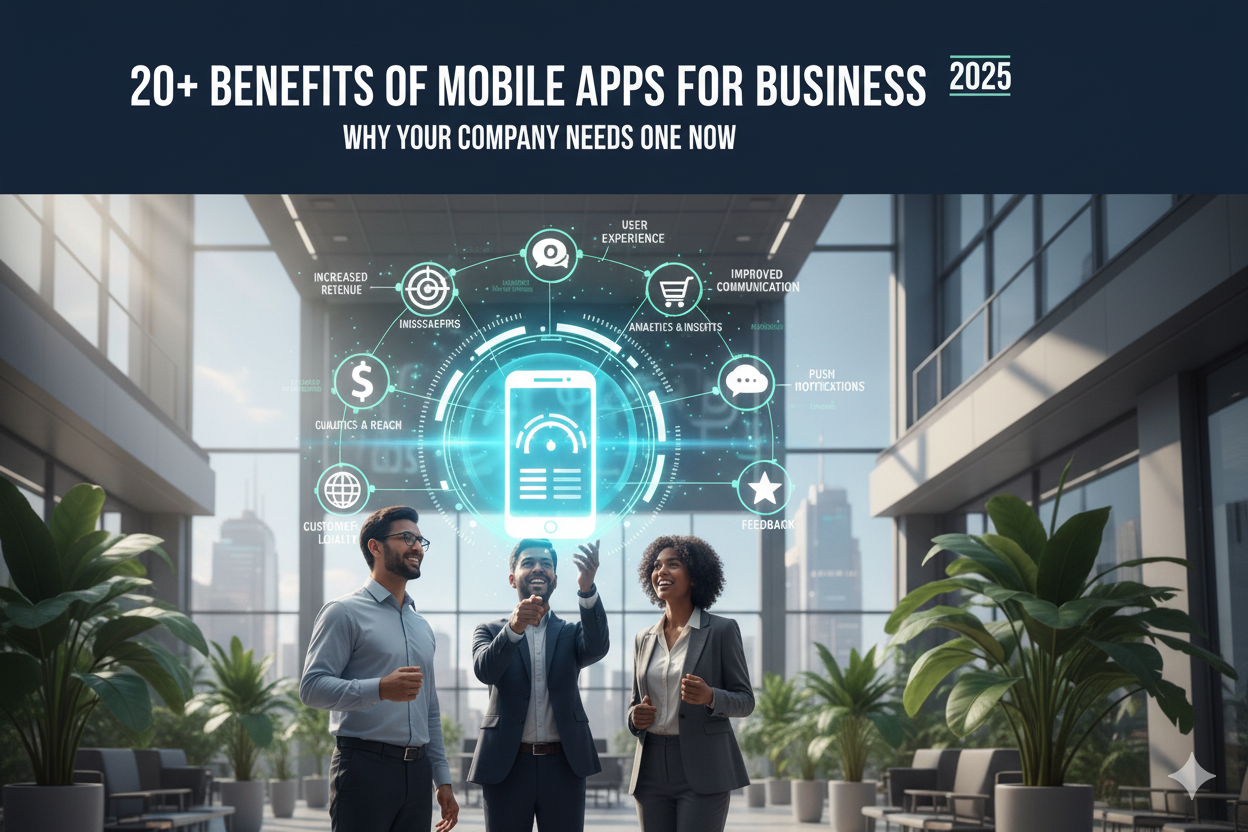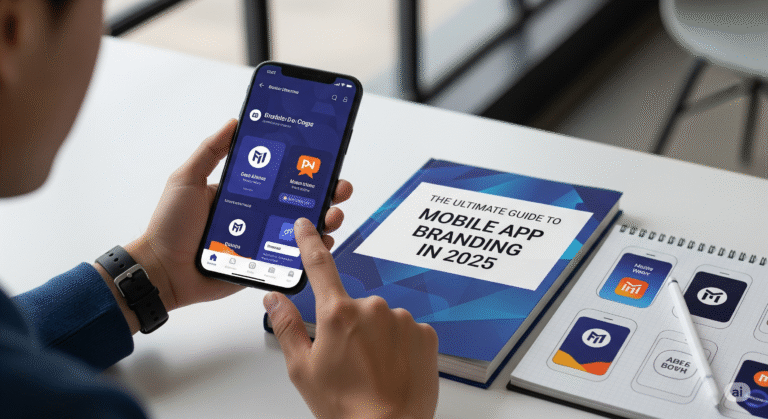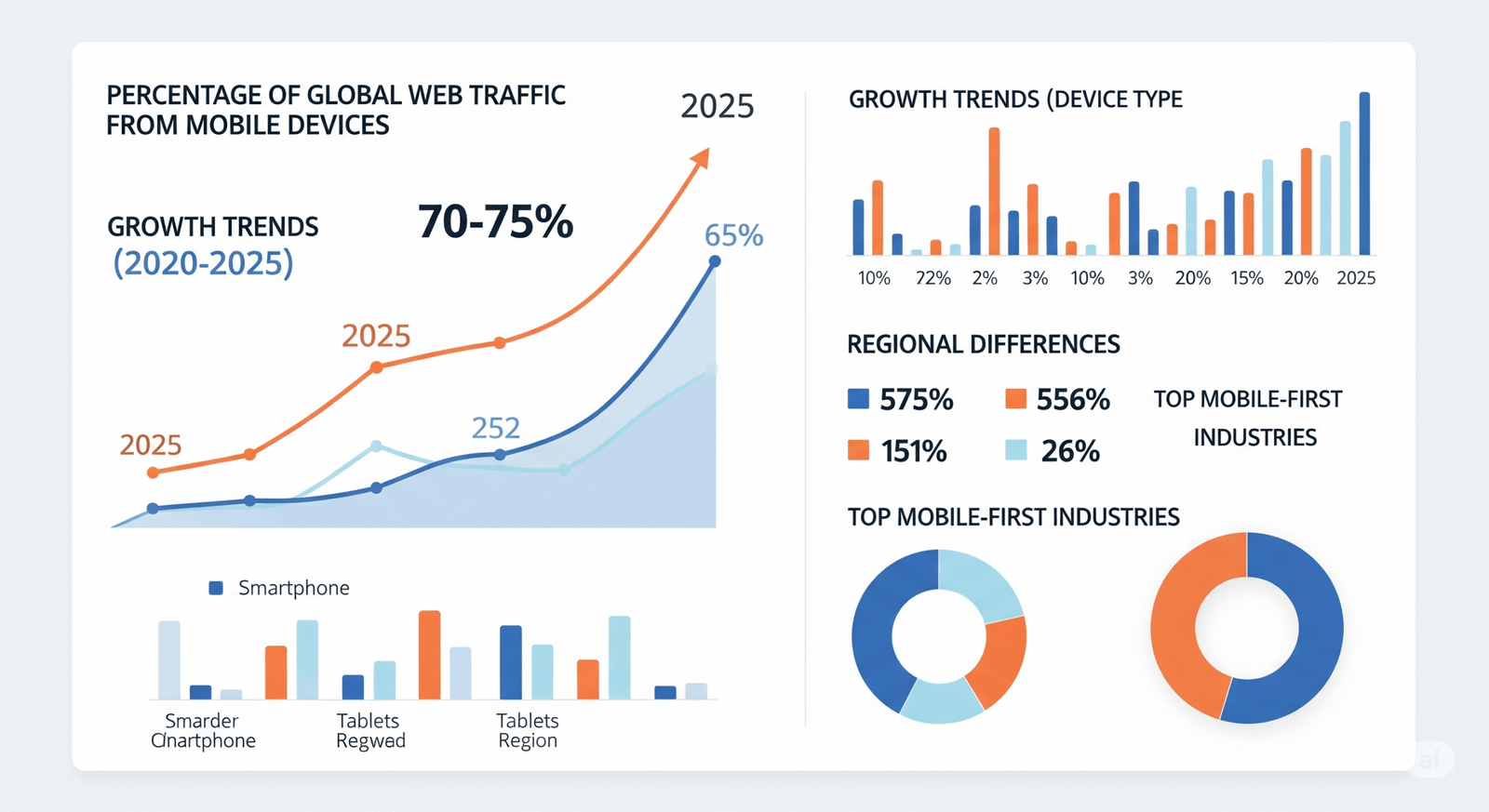20+ Benefits of Mobile Apps for Business 2025: Why Your Company Needs One Now
I was grabbing coffee with a client last week when she asked me something that made me pause: “Do you really think my small business needs a mobile app?” I watched her unconsciously check her phone three times during our 30-minute conversation, and I realized she’d already answered her own question.
We’re living in a world where people reach for their phones before their laptops every single time. Your customers? They’re already there, spending over 4 hours daily on mobile apps. The real question isn’t whether the benefits of mobile apps for business 2025 are worth it—it’s whether you can afford to miss out on this massive opportunity.
Here’s what really opened my eyes: mobile app revenue is set to hit $585.70 billion in 2025. That’s not just a number—that’s your potential customers telling you exactly where they want to engage with businesses like yours. Understanding the benefits of mobile apps for business 2025 has become crucial for companies wanting to stay competitive.
After helping dozens of companies navigate their mobile journey, I’ve seen firsthand how the right app can completely transform a business. Some of my clients have tripled their customer engagement, others have seen 70% increases in revenue. But here’s the thing—it’s not magic. It’s about understanding what makes the benefits of mobile apps for business 2025 so powerful in today’s mobile-first world business growth environment.
Table of Contents
Why I’m Convinced Every Business Needs an App
Look, I’ll be honest with you. Five years ago, I was skeptical about mobile apps for smaller businesses. “Isn’t a website enough?” I used to think. Then I started working with companies that took the plunge, and the results completely changed my perspective on the benefits of mobile apps for business 2025.

The advantages of business mobile apps go way beyond having a fancy icon on someone’s phone. I’ve watched businesses transform their customer relationships, streamline their operations, and unlock revenue streams they never knew existed. One restaurant client saw their repeat customers increase by 200% after launching their app with a simple loyalty program—a perfect example of how the benefits of mobile apps for business 2025 translate into real results.
What really convinced me was seeing how customer behavior has fundamentally shifted. People don’t just prefer mobile experiences—they expect them. The businesses thriving in this mobile-first world business growth era are the ones meeting customers where they already are and leveraging the benefits of mobile apps for business 2025 to their advantage.
The 20+ Game-Changing Benefits I’ve Witnessed
1. Real Customer Engagement That Actually Works
Here’s something that blew my mind: one of my e-commerce clients increased their customer engagement by 88% within three months of launching their app. How? Strategic push notifications that actually added value.
Customer engagement via mobile apps isn’t about bombarding people with messages. It’s about creating meaningful touchpoints that your customers appreciate. I’ve seen businesses use push notifications to alert customers about back-in-stock items, exclusive flash sales, and personalized recommendations based on their shopping history.
The key is relevance. When you send a push notification about a 20% discount on someone’s favorite product category, they don’t see it as spam—they see it as helpful. That’s the difference between annoying your customers and delighting them.
What I’ve learned works: Time your notifications carefully. My most successful clients send push notifications when their customers are most likely to engage—usually between 6-8 PM on weekdays.
2. Brand Visibility That Never Sleeps
Think about your phone’s home screen right now. Those app icons represent brands that have secured permanent real estate in your daily life. That’s incredibly powerful.
I had a boutique fitness studio client who was struggling with brand awareness in a crowded market. Within six months of launching their app, they became the go-to fitness choice in their area. Why? Because their app icon was a daily reminder of their brand, sitting right between Instagram and their customers’ favorite shopping app.
The advantages of business mobile apps include this always-on marketing presence that traditional advertising simply can’t match. Your brand becomes part of your customers’ daily routine, which is marketing gold.
Pro insight: Design your app icon to be instantly recognizable and aligned with your brand colors. It’s often the first (and sometimes only) thing people see of your brand.
3. Customer Experience That Wins Hearts
I’ve never seen anything transform customer satisfaction quite like a well-designed mobile app. One of my retail clients saw their customer satisfaction scores jump from 3.2 to 4.8 stars after launching an app with features like saved preferences, quick reordering, and instant customer support chat.
Modern customers don’t just want convenience—they demand it. Your app can provide 24/7 access to your products and services, personalized shopping experiences, and instant problem resolution. The benefits of mobile apps for business 2025 really shine here because apps can deliver experiences that websites simply can’t match.
I remember working with a local pharmacy that was losing customers to big chains. Their app allowed customers to refill prescriptions with one tap, get medication reminders, and even schedule deliveries. Suddenly, they weren’t competing on price anymore—they were winning on convenience, demonstrating the real benefits of mobile apps for business 2025.
Real-world tip: Include a simple feedback mechanism in your app. Some of my most successful clients use quick emoji rating systems that take less than 5 seconds to complete.
4. The Competitive Edge That Matters
Here’s a reality check: if your competitors have apps and you don’t, you’re already behind. But here’s the good news—in many industries, mobile apps are still relatively uncommon, which means you have a chance to be first in your market.
I worked with a local accounting firm that became the first in their area to offer a mobile app for document uploads and appointment scheduling. Within a year, they had captured 40% more clients than their nearest competitor, simply because they were more accessible and convenient.
The mobile-first world business growth trend means that businesses without mobile presence are increasingly seen as outdated or hard to work with. Your app becomes a differentiator that sets you apart from competitors who are still stuck in the desktop era.
Strategy that works: Focus on solving one specific problem better than anyone else. Don’t try to build everything at once—nail one feature that makes customers’ lives significantly easier.
5. Revenue Growth You Can Measure
Let me share some numbers that will get your attention. My clients with mobile apps typically see 70% higher revenue per customer compared to web-only interactions. Why? Because apps make buying easier, faster, and more personalized—core aspects of the benefits of mobile apps for business 2025.
One fashion retailer I worked with implemented features like saved payment methods, personalized product recommendations, and exclusive app-only deals. Their mobile app conversion rate hit 3.2%, compared to 1.8% on their website. That difference adds up fast and showcases the tangible benefits of mobile apps for business 2025.
The benefits of mobile apps for business 2025 include multiple revenue streams: in-app purchases, subscription services, premium features, and increased purchase frequency through convenience and loyalty programs.
Revenue booster: Create app-exclusive products or early access to sales. This not only drives app downloads but also makes your app users feel special and valued.
6. Customer Loyalty That Lasts
I’ve seen loyalty programs on websites fail miserably, but the same programs thrive on mobile apps. There’s something about having a loyalty program literally in your pocket that makes it more engaging and memorable.
A coffee shop client implemented a simple punch-card system in their app—buy 10 coffees, get one free. But they took it further with surprise rewards, birthday treats, and personalized offers based on order history. Their repeat customer rate increased by 150%.
Customer engagement via mobile apps creates habits. When customers have easy access to their rewards, order history, and favorite items, they’re more likely to choose your business over competitors.
Loyalty hack: Gamify the experience with points, levels, and surprise rewards. I’ve seen customers get genuinely excited about reaching the next tier in their favorite app’s loyalty program.
7. Marketing That Actually Reaches People
Email marketing gets 20% open rates on a good day. Push notifications? I’ve seen them achieve 90% open rates with the right strategy. That’s not a typo—push notifications strategy implementation can revolutionize how you communicate with customers.
But here’s the catch—you need to earn the right to be in someone’s notifications. I always tell my clients: every push notification should provide clear value. Whether it’s an exclusive discount, important update, or personalized recommendation, make sure it’s worth interrupting someone’s day.
One restaurant client sends push notifications about daily specials to customers who’ve ordered similar items before. Their notifications have a 65% engagement rate because they’re relevant and timely.
Notification wisdom: Less is more. I’ve seen businesses kill their app engagement by sending too many notifications. Start with one per week and increase only if engagement remains high.
8. Operations That Run Themselves
This is where I get really excited about mobile apps. The operational benefits are often overlooked, but they can be game-changing for business efficiency.
I worked with a small restaurant that was drowning in phone orders during lunch rush. Their app automated 70% of their orders, reduced errors by 80%, and freed up staff to focus on food quality and customer service. The owner told me it was like hiring three extra employees without the payroll.
Apps can automate inventory tracking, customer service inquiries, appointment scheduling, and payment processing. According to Salesforce research, businesses see an average 41% productivity increase when they integrate mobile apps into their operations.
Automation opportunity: Start with your most time-consuming manual process. Whether it’s appointment booking or order taking, automating just one process can free up significant time and resources.
9. Security You Can Trust
Here’s something that keeps me up at night: 43% of small businesses experience data breaches. That’s not just a statistic—that’s potentially your business, your customers, and your reputation on the line.
Modern mobile apps can actually provide better security than traditional websites. With features like biometric authentication, encrypted data storage, and secure payment processing, apps offer multiple layers of protection that customers trust.
I’ve seen businesses gain customer confidence simply by demonstrating their commitment to data security through their app design and features.
Security essential: Regular updates aren’t just about new features—they’re about staying ahead of security threats. Make sure your development partner prioritizes security updates.
10. Authority That Opens Doors
There’s something about having a professional mobile app that instantly elevates your brand perception. I’ve watched small businesses suddenly compete with much larger companies simply because their app made them appear more established and professional.
One local service provider told me their app helped them win a major corporate contract because it demonstrated their commitment to technology and customer service. The client said the app was what convinced them this small business could handle their needs.
In today’s market, having a well-designed app signals that you’re forward-thinking, customer-focused, and serious about your business.
Authority builder: Make sure your app reflects your brand’s quality and values. A poorly designed app can hurt your credibility more than having no app at all.
11. Sales That Convert Better
Mobile app conversion rate optimization is something I’m passionate about because I’ve seen the dramatic results it can deliver. Apps consistently outperform websites in conversion rates, often by 200-300%—a key aspect of the benefits of mobile apps for business 2025.
Why do apps convert better? Saved payment information, personalized product suggestions, simplified checkout processes, and the elimination of browser-related issues all contribute to smoother purchasing experiences. These advantages represent core benefits of mobile apps for business 2025 that smart businesses are already leveraging.
One online retailer saw their mobile app conversion rate reach 5.2% compared to 2.1% on their mobile website. The difference? Fewer steps to purchase, better load times, and personalized product recommendations based on app usage patterns—all demonstrating the measurable benefits of mobile apps for business 2025.
Conversion secret: Reduce friction at every step. If customers need to enter information they’ve already provided, you’re creating unnecessary barriers to purchase.
12. Markets Without Borders
Apps have opened up markets for my clients that they never thought possible. A small artisan jewelry maker in my network now ships worldwide because her app made international ordering simple and trustworthy.
App Store Optimization (ASO) can help your business get discovered by customers searching for products or services like yours. I’ve seen local businesses become regional players and regional businesses go national through strategic app development and marketing.
Your app becomes a 24/7 salesperson that never sleeps, never takes breaks, and can serve customers in any time zone.
Global growth tip: Start local, then expand. Master your home market through your app, then use that success to fuel expansion into new geographic areas.
13. Personal Touch at Scale
Here’s where mobile apps really shine: delivering personalized experiences that feel custom-made for each user. I’ve seen businesses create apps that know their customers better than their own staff do.
91% of consumers prefer brands that provide personalized experiences, and apps are the perfect platform for this kind of customization. Purchase history, browsing behavior, location data, and user preferences all combine to create unique experiences for each customer.
A bookstore client uses their app to recommend new releases based on past purchases, send notifications about author events in their area, and even remember their favorite reading spots in the store.
Personalization power: Start simple with personalized greetings using customers’ names, then gradually add more sophisticated features based on user data and behavior patterns.
14. Customers Who Become Advocates
The most successful apps I’ve worked on turn satisfied customers into brand evangelists. Social sharing features, referral programs, and exceptional experiences encourage users to spread the word about your business.
Word-of-mouth marketing through apps feels more authentic than traditional advertising. When someone shares their positive experience with your app, it carries more weight than any ad you could create.
I’ve seen businesses grow their customer base by 50% purely through app-driven referrals and social sharing.
Advocacy amplifier: Make sharing easy and rewarding. Offer incentives for referrals, but make sure the sharing process is simple and the rewards are meaningful.
15. Feedback That Drives Growth
Apps provide direct channels for customer feedback that can transform your business. In-app surveys, rating systems, and review features give you real-time insights into what’s working and what needs improvement—essential components of the benefits of mobile apps for business 2025.
One service business I work with uses their app to collect feedback after every interaction. This continuous feedback loop has helped them identify and fix problems quickly, leading to consistently higher customer satisfaction. This approach perfectly demonstrates the practical benefits of mobile apps for business 2025 in action.
The benefits of mobile apps for business 2025 include this ability to stay closely connected with customer needs and preferences through ongoing feedback collection.
Feedback strategy: Make giving feedback rewarding. Offer small incentives for survey completion, but keep surveys short and focused on actionable insights.
16. Growth That Sustains Itself
Mobile apps create sustainable growth through continuous customer engagement. Unlike one-time marketing campaigns, apps provide ongoing touchpoints that build stronger relationships over time.
Regular app updates with new features, content, and improvements show customers that you’re committed to providing value. This ongoing investment in the customer relationship pays dividends through increased loyalty and lifetime value.
Sustainability secret: Plan for the long term from day one. Build your app with the infrastructure to support growth and the flexibility to add new features as your business evolves.
17. Payments Made Simple
The mobile payment market is exploding—it’s projected to exceed $12.06 trillion by 2027. Customers expect fast, secure, and convenient payment options, and apps deliver exactly that.
I’ve watched businesses reduce cart abandonment by 60% simply by implementing saved payment methods and one-tap purchasing in their apps. The easier you make it to pay, the more likely customers are to complete their purchases.
Multiple payment options including credit cards, digital wallets, and even cryptocurrency can accommodate different customer preferences and expand your potential market.
Payment optimization: Offer multiple payment methods but make the default option the fastest. Most customers will use whatever’s easiest.
18. Features That Put Customers First
Customer-centric app design focuses on solving real problems and making life easier for users. Features like customizable interfaces, intelligent notifications, instant customer support, and loyalty rewards all contribute to superior customer experiences.
The most successful apps I’ve worked on prioritize user needs over business needs in their design decisions. This customer-first approach ultimately drives better business results through increased satisfaction and loyalty.
Customer-first principle: Before adding any feature, ask yourself: “Does this make life easier or better for my customers?” If the answer isn’t a clear yes, reconsider.
19. Investment That Pays Back
While mobile app development requires upfront investment, the long-term ROI makes apps incredibly cost-effective business tools. Apps can reduce costs in customer service, marketing, and sales while generating new revenue streams.
One client reduced their customer service costs by 40% by implementing an app with self-service features, FAQs, and chatbot support. The app paid for itself within eight months through reduced operational costs and increased sales.
Cost-effectiveness strategy: Focus on features that either reduce operational costs or increase revenue. The best apps do both simultaneously.
20. Business Model That Scales
Apps provide scalable platforms that grow with your business. Whether you’re serving 100 customers or 100,000, your app can handle the load with proper planning and infrastructure.
This scalability makes apps ideal for businesses with growth ambitions. As your customer base expands, your app becomes more valuable rather than more burdensome.
Scaling smart: Design your app architecture to handle growth from the beginning. It’s much easier to build scalability in from the start than to retrofit it later.
The Hottest App Categories Making Money Right Now
Based on my experience and current market trends, here are the app categories generating the most revenue:

E-commerce Apps are absolutely crushing it right now. Retail mobile sales are expected to hit $6.4 trillion in 2024. The key is personalization and convenience—customers want shopping experiences that understand their preferences and make purchasing effortless.
Gaming Apps dominate the mobile market with $100.54 billion in revenue in 2024. Even non-gaming businesses can learn from gaming apps’ engagement strategies: rewards, progression systems, and social features that keep users coming back.
Health and Fitness Apps have exploded, especially post-pandemic. People want to track their wellness, connect with trainers, and access fitness content on-demand. The subscription model works particularly well here.
Food Delivery and Restaurant Apps have become essential. Even small restaurants now need apps to compete. The convenience factor is huge—customers want to order, pay, and track their food all in one place.
Your Next Steps (From Someone Who’s Been There)
After working with hundreds of businesses on their mobile app journeys, here’s my honest advice on getting started. The benefits of mobile apps for business 2025 are undeniable, but success requires strategic planning:
Start with Strategy, Not Features: Before you think about what your app will do, think about why your customers need it. What problem are you solving? What value are you providing? The most successful apps I’ve worked on solve real problems elegantly while maximizing the benefits of mobile apps for business 2025.
Focus on One Thing First: Don’t try to build everything at once. Pick one core feature that will make your customers’ lives significantly better and nail that. You can always add features later while continuing to realize the benefits of mobile apps for business 2025.
Think Mobile-First: Your app isn’t just a smaller version of your website. Mobile users behave differently—they’re often multitasking, have limited attention, and want immediate results. Design for these realities to fully capture the benefits of mobile apps for business 2025.
Plan for Success: Build your app with growth in mind. Choose development partners who understand scalability and can support your business as it grows.
The advantages of business mobile apps are clear, but success requires more than just good intentions. You need a team that understands both technology and business strategy to help you realize the full benefits of mobile apps for business 2025.
At YAAM Web Solutions, we’ve helped businesses across industries harness the benefits of mobile apps for business 2025. We don’t just build apps—we build growth engines that transform how businesses connect with their customers.
The Bottom Line
Look, I could share more statistics and case studies, but here’s what really matters: the mobile-first world business growth trend isn’t coming—it’s here. Your customers are already living mobile-first lives, and the businesses that recognize and adapt to this reality are the ones that will thrive by embracing the benefits of mobile apps for business 2025.
But here’s the good news: it’s not too late. In fact, in many industries, you can still be first to market with a really great app experience. The question is: are you ready to take advantage of this opportunity and unlock the benefits of mobile apps for business 2025 for your company?
Ready to Transform Your Business?
YAAM Web Solutions specializes in creating mobile apps that don’t just look good—they drive real business results and deliver the full benefits of mobile apps for business 2025. Our team combines technical expertise with deep business understanding to create apps that your customers will love and your business will profit from.

We’ve guided companies through every stage of mobile app development, from initial strategy to launch and beyond, helping them realize the complete benefits of mobile apps for business 2025. Whether you’re a small local business or a growing company with national ambitions, we can help you harness the power of mobile apps to accelerate your growth.
Don’t let another day pass wondering “what if?” Contact YAAM Web Solutions today, and let’s discuss how a custom mobile app can help you unlock the benefits of mobile apps for business 2025 and transform your business beyond.







